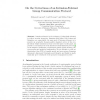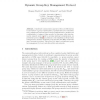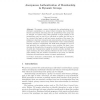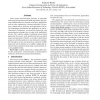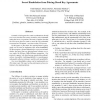43 search results - page 6 / 9 » Certificateless Authenticated Group Key Agreement Protocol f... |
109
Voted
CHARME
2003
Springer
15 years 7 months ago
2003
Springer
Intrusion-tolerance is the technique of using fault-tolerance to achieve security properties. Assuming that faults, both benign and Byzantine, are unavoidable, the main goal of Int...
110
click to vote
MMMACNS
2001
Springer
15 years 6 months ago
2001
Springer
If multicast communication appears as the most efficient way to send data to a group of participants, it presents also more vulnerabilities to attacks and requires services such as...
FC
1999
Springer
15 years 6 months ago
1999
Springer
Abstract. We present a series of protocols for authenticating an individual’s membership in a group without revealing that individual’s identity and without restricting how the...
137
click to vote
ACSAC
2001
IEEE
15 years 5 months ago
2001
IEEE
Secure group communication protocols, in particular multi-party key agreement and update algorithms, help promote traditional and new Internet multi-party applications such as vid...
138
click to vote
SP
2003
IEEE
15 years 7 months ago
2003
IEEE
Consider a CIA agent who wants to authenticate herself to a server, but does not want to reveal her CIA credentials unless the server is a genuine CIA outlet. Consider also that t...
